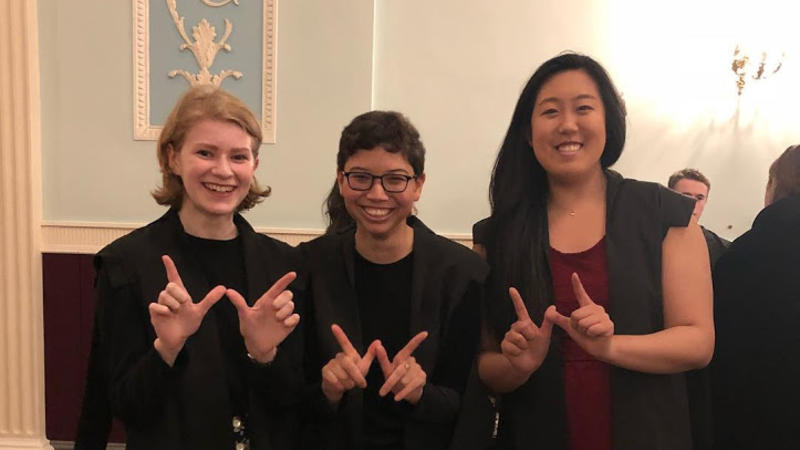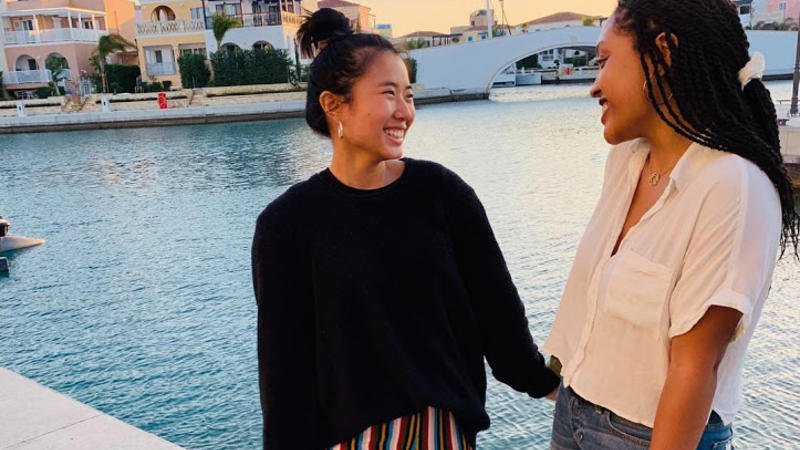Identity Abroad
Identity Abroad
What you will encounter abroad may not always be the same welcoming community that Wellesley offers. Different cultures are going to have different levels of sensitivity, but that does not mean you need to change anything about yourself to go abroad. Students who are a minority student in their host country sometimes receive additional attention, which may or may not be discrimination. You can talk with your host family and program to discuss issues that may arise while you are abroad and brainstorm solutions that both respect the host culture and your own identity. The following tips and resources may also help you prepare for your time abroad.
Please note that all Wellesley students have access to the member-only resources on DiversityAbroad.org! Log-in information can be found here (log-in required).
Please contact OIS if you have questions about accessing these resources:
What types of laws are in place? What is the political climate? Learn as much as you can about the culture, religion, living and health conditions before you go so you know more of what to expect.
- Check out Diversity Abroad's Destination Guides. These guides include advice for specific identity groups, information about destination-specific funding opportunities, health and safety tips, and more.
- IES Abroad's Country-Specific Resources include information such as dietary concerns, resources for racial and ethnic minorities, LGBTQ+ and religious identities, and disability and mental health support.
- Read Brown University's survey of students' experiences with their identity in various locations around the world.
- This spreadsheet shows reviews by Wellesley students over the last 8 years that highlight diversity and LGBTQ+ standards abroad.
Resources for all racial and ethnic minority students:
-
Diversity Abroad's guide for Racially and Ethnically Diverse Students
- Center for Global Education: provides websites geared toward helping underrepresented or underprivileged groups
- AllAbroad: resources from different organizations dedicated to increasing participation of minority students
- "Being Me Abroad" video
- Being a Student of Color Abroad - DIS Copenhagen blog post/video
African-American/Black Students:
- Study Abroad Guide for Wellesley Students of African Descent
- Adriana Smith's book, Study Abroad for Black Women
- Travel Noire: travel tools, resources, and stories from black travelers
- "Black in Beijing" perspective piece from CET Abroad
- University of Wisconsin - Madison: Study abroad resources for Black students
- IES' Being Me Abroad - Traveling with Natural Hair video playlist
Latinx Students:
- All Abroad: Reasons to Study Abroad for Hispanic/Latin@ Students
- All Abroad: What About Discrimination for Hispanic/Latin@ Students
- IES Blog - The Truth Revealed: 9 Misconceptions about Latinx Students & Study Abroad Debunked
- University of Wisconsin - Madison: Study abroad resources for Latinx students
- GoAbroad's Meaningful Travel Tips and Tales for Latinx Travelers
- Latinas Who Travel
Asian/Asian-American Students:
- University of Wisconsin - Madison: Study abroad resources for Asian students
- IES Abroad Blog: Asian in America, American in Asia
- Medium: As an Asian-American Abroad
- PLATO Project: 10 Reasons for Asian/Pacific Islander Students to Study Abroad
- IFSA Blog: Finding Identity as an Indian Heritage Student
Indigenous/Native American Students:
- All Abroad: Reasons to Study Abroad for Native American Students
- All Abroad: What about Discrimination for Native American Students
- University of Wisconsin - Madison: Study abroad resource for indigenous students
- CIS Abroad: Increasing Access for Indigenous Students in Internatinal Ed
The prospect of studying abroad can be exiciting and overwhelming, especially if you're the first member of your family to do so. Not sure where to start? Talk to OIS or upperclass students. We'll walk you through the process and speak to amy concerns you may have.
"I discovered that my family background, which I always considered a barrier, actually had provided me with impressive intercultural competencies. I could already communicate across social class lines and understood the transition from immigrant to American. Why not take that knowledge across borders? What was perceived to be a deficit became a great benefit."
- Karen Collias, founder of Knowledge WIthout Borders
Resources
- Knowledge Without Borders: Global Travel Benefits for First Gen Students
- I'm First: blogs from first-gens about their study abroad experiences
- University of California Santa Cruz advice for first-gen students
- Article by Purdue University, "First Time Travelers"
- Diversity Abroad's guide for First Generation College Students
- GoAbroad's ebook: The First Generation Stdents Study Abroad Guide
Understanding of sexual orientation, gender identity, and gender expression may differ depending on where in the world you are traveling. Going abroad can thus present the opportunity to think about LGBTIA+ identity in a whole new way. Before going abroad, determine your own individual needs and request information on how these can be met. It is also helpful to consider the following:
- How important is it to me to go somewhere accepting of my identity? What type of destination will I be happiest in?
- What does LGBT+ expression look like in my destination? How does this differ from what I'm used to?
- What are the social attitudes towards being LGBT+ in my destination?
- What resources are available in my host country or program?
- How will my intersectional identities be perceived in my destination?
- Will I need access to any medications, supplies, or services while abroad? How will I get these?
Gender Markers and Official Documentation:
Since 2021, the U.S. Department of State has allowed individuals to select male (M), female (F), or unspecified (X) as their gender marker on passport applications. This marker does not need to match that on your supporting documentation. Though the State Department will issue a passport with an X gender marker, this does not guarantee you entry into other countries. Some destinations may not recognize the X gender marker. Before traveling, it is imperative that you check with the foreign embassy or consulate of the destination country in the United States.
International students will need to consult their embassy or consulate to determine if an X gender marker is available to them.
Resources:
- LGBTQ+ Abroad Guide for Wellesley Students
- StudyAbroad: what to expect as an LGBT study abroad students
- Diversity Abroad: LGBTQ+ students abroad considerations
- Diversity Abroad: Country Travel Guides for more specific DEI information by destination
- University of Wisconsin - Madison resources for LGBTQ+ Students
Student Stories:
- GoOverseas Blog: 9 Major Life Lessons I Learned Studying Abroad as an LGBT
- GlobalGayz: an online journal documenting the travels of LGBT individuals around the world
- Carleton College Blog: 10 Reasons Why LGBTQ Students Should Study Abroad
Travel and Safety:
- ILGA: The International Lesbian, Gay, Bisexual, Trans and Intersex Association
- Equaldex: The Collaborative LGBT Rights Knowledge Base
- OutRight Action International: Advocacy organization that reports on LGBTQ human rights violations
- National Center for Transgender Equality's Know Your Rights: Airport Security
- US Department of State: Travel information for LGBTI individuals
- IES Abroad: Air Travel Tips for Transgender Students Studying Abroad
Studying abroad with a disability is absolutely possible, and we will work closely with you to identify program options and accommodations best suited to your needs.
- Abroad with Disabilities: join their discussion groups, forums, and webinars to learn about the study abroad experiences of students with disabilities
- Mobility International USA
- An article by The Seattle Globalist with things to keep in mind when choosing location
- Diversity Abroad's guide for Students with Disabilities
- Studee's Ultimate Guide to Studying Abroad with a Disability
- US State Department Travelers with Disabilities
Wellesley-specific resources:
- Transcript of Recent OIS Studying Abroad with a Disability Panel
- Accessibility of Study Abroad Programs (created by Student Ambassador Lidewij Florusbosch '24)
- Contact Information for Accessibility of Study Abroad Programs
- Studying Abroad with a Disability Guide
- Advice & Guidance on Studying Abroad with a Disability (blog post written by Lidewij Florusbosch '24 for the Student Access Advocates)
Take a look at the resources below for tips and trickets when it comes to financing your time abroad. OIS staff are also available to speak with you at any time about study abraod scholarship opportunities. Contact Katie Saibara for more information.
- IES webinar: Show Me the Money: Explore How to Fund Study Abroad When Money is Tight and Maximize the Experience
- DiversityAbroad article, "8 Study Abroad Scholarships That Every Student Should Know About"
- IES Abroad's tips from correspondents: Budgeting While Abroad
- Review our list of study abroad scholarships. We would like to highlight the Fund for Education Abroad and Benjamin A. Gilman scholarships.
- Diversity Abroad's guide for students on a budget
- Diversity Abroad's guide for Religious Identity
- Islamic Finder: prayer times, Islamic organizations, and mosques worldwide
- All Hindu Temples: Hindu temples in more than 50 countries
- International churches: churches worldwide
- World Buddhist Directory: Buddhist centers worldwide
- KAHAL - Your Jewish Home Abroad: resources for students looking to be connected with Jewish communities around the world. KAHAL also sponsors a paid Global Ambassadors Fellowship for Jewish students studying abroad.
Health
- Our page on staying healthy while abroad
- IES Blog - Student Advice: How to Maintain Your Health While Studying Abroad
- Check out our Study Abroad Handbook section on health
Mental Health
- Mental Health and Wellness Studying Abroad (by Wellesley College Active Minds)
- An IFSA student's blog about Mental Health Issues Abroad
- DiversityAbroad's tips on Managing Mental Health While Abroad
Safety
- USAC video on personal safety while abroad
- Yale's page on Sexual Harassment or Assault Abroad
Diet/Food
- IES Abroad's Dietary Resources page
- Northwestern's page on Dietary Restrictions
- Your Passport to Social Identity Abroad, by IES Abroad
- Diversity Abroad article "Dealing with Stereotypes While Studying Abroad"
- Institute for Study Abroad's "Unpacked: A Study Abroad Guided for Students Like Me," with student perspectives on diversity and identity abroad
- 3 Steps to Take Before You Talk to Your Parents About Studying Abroad
- CET's Diversity and Inclusion page
- TEAN's Student Identity and Support page
- Diversity Abroad's guide for Women going abroad
- Go Oversea's guide for studying abroad as a College Athlete
- IES Abroad's Intercultural Competency Reading and Podcast lists



